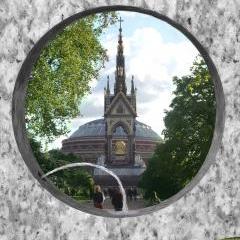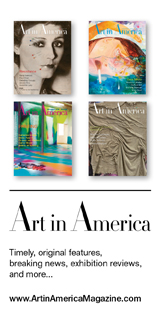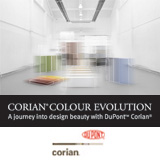Tiffany - Across The Water
Winners Announced
London
To Celebrate its 10th anniversary the Tiffany Foundation donated $1.25 million to the Royal Parks Foundation creating the Tiffany - Across the Water program, which focuses on creating ornamental drinking foundations throughout London's eight royal parks.
In June 2010, the Royal Parks Foundation launched a global design competition, requesting submissions for innovative new drinking fountain ideas. After receiving applications from 125 different countries, the Jury have selected two british designers, Moxon Architects and Robin Monotti Architects with Mark Titman.
"Watering Holes" by Mark Titman for Robin Monotti Architects
The fountain is a sculptural slab of Cornish granite perforated with three circular holes. The three holes relate to the drinking heights of adults (the higher one), children and wheelchair users (the middle one), and pets (the lowest hole). To the side of each circular hole will be the mouth of a water jet that is controlled by a respective push button on the side that allows the water to flow as it is pressed. The water flows down the circular cut, and the circle prevents any splashing to reach the person drinking. Having reached the lower section of the circle, the water flows down the face of the fountain to be collected in a trough at the bottom through which the water is drained.
The main slab is matt sawn granite, whereas the inside of the cylindrical voids will be polished and reflective.
The positioning of the fountain within the Royal Parks will be considered with reference to the views that will be framed by the circular holes when in proximity of the fountain. The simplicity of the shapes of the rectangle for the main body, and the circle for the hole are designed to give the fountain an easily recognizable identity that can be perceived from a distance a sculptural element within the park.
From Moxon Architects
The Royal Parks Foundation Drinking Fountain is intended as a formally elegant addition to the repertoire of urban furniture already provided in London's Royal Parks. It is hoped that the design will be understood as being at once understated, accessible and joyful.
The body of the fountain could be cast as one single element by a bell foundry, in exactly the same manner in which church bells are made, using bronze alloy cast between a male and female mould. Excess water is caught by the flared bell at the top and guided through the centre of the fountain to drain at the bottom of the structure.
Above all else the design is intended as a playful, robust, informative and appropriate piece of public design.
In considering the Grade 1 listed environments in which the fountain must be placed it is vital that it can exist as a high quality, contemporary piece of design that is compatible with a wide range of existing items of design, from many periods and in many styles.
Therefore the single most important consideration in the design of this fountain has been to ensure that its aesthetic qualities make it suitable for use in a wide range of circumstances - historic, modern, urban, pastoral…
The form has been tailored to suit modern means of manufacture and regulations, whilst also allowing for a sympathetic incorporation into important and sensitive locations.
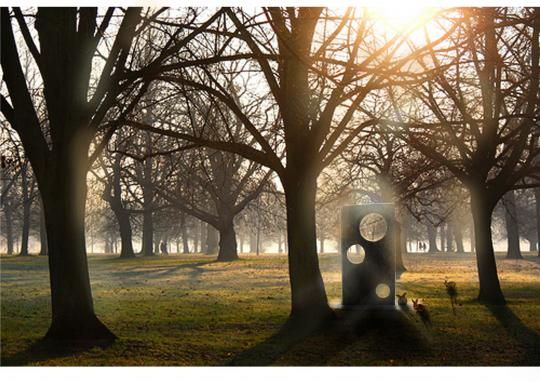
Watering Holes by Robin Monotti Architects with Mark Titman
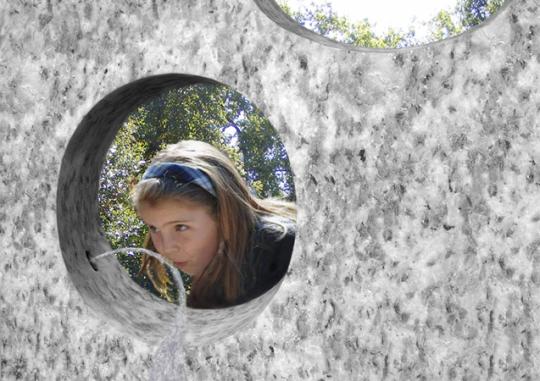
Watering Holes by Robin Monotti Architects with Mark Titman
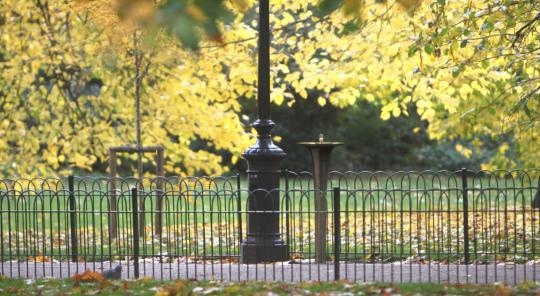
Trumpet Fountain by Moxon Architects






